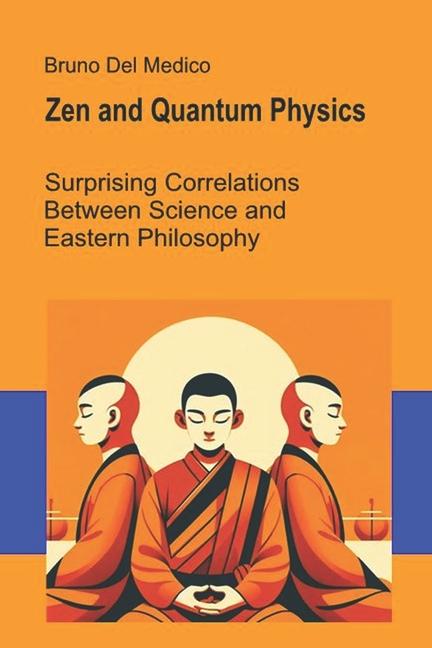Description
The encounter between Zen philosophy and quantum physics does not just represent a curious convergence of East and West, spirituality and science. Instead, it is an opportunity for a profound dialogue between two worldviews that, although born in radically different contexts, have come to question, each in its own way, the same fundamental questions about reality, perception, and consciousness.
The Zen monk walks in the gardens of Kyoto. The physicist wanders, restless, through the laboratories of Geneva. Both seek answers, both embrace mystery. Master Eihei Dōgen, in the 13th century, writes in his "Shōbōgenzō" that "the Way is fundamentally perfect and penetrates the whole. But who recognizes it?" A few centuries later, Niels Bohr, among the originators of quantum physics, says, "Whoever is not surprised by quantum theory has not really understood it." An identical urgency surfaces in these two sentences: reality is never what it seems at first glance. Appearance betrays, truth hides under the veil of custom.
Zen philosophy cultivates the art of paradox. Its kōan break ordinary logic and open glimpses of silence. Quantum physics speaks the language of experiments that contradict common sense. In 1927, in Solvay, Einstein challenges Bohr: "God does not play dice with the universe." But reality responds with the unpredictability of particles, with the mystery of the observer changing the observed world. Laboratories become temples, meditation resembles a journey into the invisible.
There is a thin thread that binds, across centuries and cultures, the Zen monastery and the science laboratory. Both celebrate uncertainty. Both question dogma. Zen invites the dropping of words and direct experience. Quantum physics unmasks the rigidity of categories and shows that the atom, time, even space, are not absolute, but appear mutable and relational.
Heisenberg, father of the uncertainty principle, found consolation in Eastern readings. Schrödinger read the Indian Upanishads and meditated on the concept of unity. Physicist Fritjof Capra, traveling in the 1970s between India and America, wrote "The Tao of Physics," and told of a cosmic dance embracing particles and meditators, scientists and monks.
Today the dialogue is not limited to books. Zen temples in the West host retreating scientists. Frontier laboratories invite philosophers and meditators. At CERN in Geneva, questions about the origin of the universe are intertwined with dilemmas reminiscent of Zen meditation: who observes, who is observed?
This is the story of a silent but powerful dialogue. It is the story of men and women who dared to think the invisible, question the absolute and welcome uncertainty. Zen philosophy and quantum physics, each in its own way, are two keys to open the same door. Behind that threshold, emptiness is not absence, but infinite potentiality. Reality is not one, but multiple. The amazement becomes method, and simplicity is revealed as the most difficult of achievements.
The Zen monk walks in the gardens of Kyoto. The physicist wanders, restless, through the laboratories of Geneva. Both seek answers, both embrace mystery. Master Eihei Dōgen, in the 13th century, writes in his "Shōbōgenzō" that "the Way is fundamentally perfect and penetrates the whole. But who recognizes it?" A few centuries later, Niels Bohr, among the originators of quantum physics, says, "Whoever is not surprised by quantum theory has not really understood it." An identical urgency surfaces in these two sentences: reality is never what it seems at first glance. Appearance betrays, truth hides under the veil of custom.
Zen philosophy cultivates the art of paradox. Its kōan break ordinary logic and open glimpses of silence. Quantum physics speaks the language of experiments that contradict common sense. In 1927, in Solvay, Einstein challenges Bohr: "God does not play dice with the universe." But reality responds with the unpredictability of particles, with the mystery of the observer changing the observed world. Laboratories become temples, meditation resembles a journey into the invisible.
There is a thin thread that binds, across centuries and cultures, the Zen monastery and the science laboratory. Both celebrate uncertainty. Both question dogma. Zen invites the dropping of words and direct experience. Quantum physics unmasks the rigidity of categories and shows that the atom, time, even space, are not absolute, but appear mutable and relational.
Heisenberg, father of the uncertainty principle, found consolation in Eastern readings. Schrödinger read the Indian Upanishads and meditated on the concept of unity. Physicist Fritjof Capra, traveling in the 1970s between India and America, wrote "The Tao of Physics," and told of a cosmic dance embracing particles and meditators, scientists and monks.
Today the dialogue is not limited to books. Zen temples in the West host retreating scientists. Frontier laboratories invite philosophers and meditators. At CERN in Geneva, questions about the origin of the universe are intertwined with dilemmas reminiscent of Zen meditation: who observes, who is observed?
This is the story of a silent but powerful dialogue. It is the story of men and women who dared to think the invisible, question the absolute and welcome uncertainty. Zen philosophy and quantum physics, each in its own way, are two keys to open the same door. Behind that threshold, emptiness is not absence, but infinite potentiality. Reality is not one, but multiple. The amazement becomes method, and simplicity is revealed as the most difficult of achievements.
Last updated on
Product Details
- Jun 29, 2025 Pub Date:
- 9798290120867 ISBN-10:
- 9798290120867 ISBN-13:
- English Language




